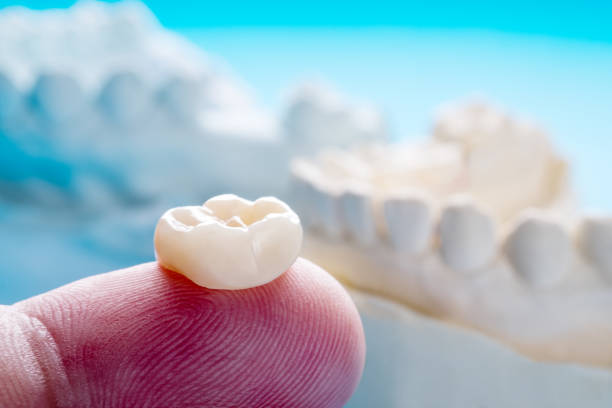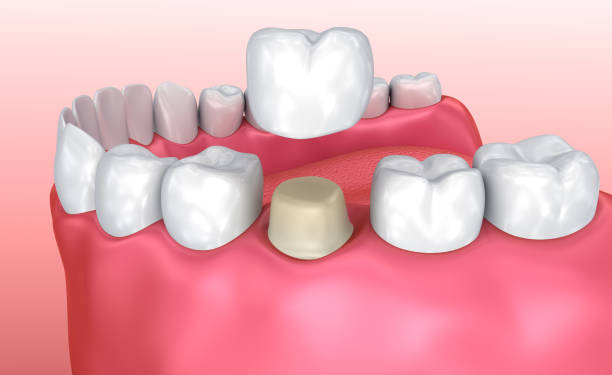How Long Do Dental Crowns Last? Truth vs. Myth
Dental crowns are one of the most common and reliable restorative treatments in modern dentistry, but how long do they actually last? You’ve probably heard everything from “they last forever” to “they break after a few years.” So, let’s clear up the confusion and separate the truth from the myths, based on both clinical experience and evidence-based dentistry.
The Basics: What Is a Dental Crown?
A dental crown is a custom-made cap that completely covers a damaged or weakened tooth. Crowns restore function, improve aesthetics, and protect the tooth from further damage. At Significant Smiles in Brisbane CBD, we use crowns made from high-quality materials like porcelain, zirconia, and ceramic, each chosen for its strength, biocompatibility, and natural appearance.
Myth #1: “Dental Crowns Last Forever”

We’d love that to be true, but no dental restoration lasts forever. Like any dental treatment, crowns have a lifespan that depends on various factors, including materials, oral hygiene, habits, and more.
 Truth:
Truth:
Most dental crowns last between 5–15 years, with many lasting 20 years or more if cared for properly.
Clinical studies and patient data support this. A 2013 systematic review published in the Journal of Dentistry showed that:
- 94% of crowns last 5 years
- 90% last 10 years
- 75–80% can last over 15 years
What Affects the Lifespan of a Dental Crown?
1. Material Used
Not all crowns are created equal. Here’s a quick breakdown:
- Porcelain-fused-to-metal (PFM): Strong, but may show a dark line over time.
- All-ceramic or porcelain: Excellent aesthetics; ideal for front teeth.
- Zirconia: Extremely strong and ideal for patients who grind their teeth.
At Significant Smiles, we use modern, metal-free materials that balance strength and beauty, especially important for crowns on front or visible teeth.
2. Oral Hygiene
Good brushing and flossing habits reduce the risk of decay at the crown margins and gum disease, two common causes of crown failure.
Pro tip: Even though the crown itself doesn’t decay, the natural tooth underneath still can.
3. Bite Forces and Habits
Clenching, grinding (bruxism), nail-biting, or chewing ice can cause premature wear or fractures. In patients with bruxism, we often recommend a custom night guard.
4. Regular Check-Ups
Routine dental visits allow us to monitor the condition of your crown, detect early issues, and perform professional cleanings. It’s often easier (and more cost-effective) to repair a small issue before it becomes a big one.
Myth #2: “Crowns Are Just for Cosmetic Purposes”
It’s true that crowns improve the appearance of damaged teeth, but their primary purpose is functional and protective.
 Truth:
Truth:
Crowns are used to:
- Restore teeth after large fillings or fractures
- Protect root canal-treated teeth
- Strengthen weakened or worn-down teeth
- Replace missing teeth as part of a dental bridge
In short: They save teeth.
Myth #3: “Once You Get a Crown, You Don’t Have to Worry About That Tooth Anymore”

This is one of the most common misconceptions. A dental crown doesn’t make your tooth invincible.
 Truth:
Truth:
- The underlying tooth is still vulnerable to decay, especially at the crown margins
- Gum disease can still affect the crowned tooth
- Crowns can loosen, fracture, or wear over time
That’s why ongoing care, at home and with your dentist, is essential for long-term success.
Myth #4: “Any Dentist Can Do a Crown the Same Way”
While dental crowns are common procedures, not all crowns are equal in quality, fit, or longevity. The skill and precision of your dentist, and their attention to detail in crown prep, impressions, and lab communication, make a huge difference.
 Truth:
Truth:
Dr. Zohal Azami brings years of experience, both clinical and academic, to every crown procedure. With a background in Human Anatomy, international volunteering, and rural dental care, she combines technical precision with deep compassion and attention to each patient’s unique needs.
How Do You Know It’s Time to Replace a Crown?
Signs a crown may need replacing:
- Pain or sensitivity around the tooth
- Visible wear, cracks, or chips
- Looseness or movement
- Receding gums around the crown
- Recurrent decay under the crown
At Significant Smiles, we’ll always assess your existing crowns during your check-ups and give you honest recommendations based on function, aesthetics, and long-term oral health.
Final Thoughts: What’s the Real Answer?
So, how long do dental crowns last?
 On average: 5–15 years
On average: 5–15 years
 With excellent care: 20+ years is very possible
With excellent care: 20+ years is very possible
 Without care or with certain habits: significantly less
Without care or with certain habits: significantly less
The real secret to long-lasting crowns?
- High-quality materials
- Skilled craftsmanship
- Excellent oral hygiene
- Regular dental care
- Addressing habits like grinding or smoking
Experience the Difference at Significant Smiles
When it comes to dental crowns, precision matters. Materials matter. And above all, your experience matters.
At Significant Smiles, we combine advanced technology, high-quality materials, and personalised care to give you dental restorations that look beautiful, and last.
If you’re experiencing issues with an old crown, or considering a new one, we invite you to book a consultation with Dr. Zohal Azami in our Brisbane CBD clinic. Let’s bring back your confidence and your smile, with lasting results.
 Book an Appointment
Book an Appointment
 Call us: (07) 3221 0481
Call us: (07) 3221 0481
 Learn more: Dental Crowns Brisbane CBD
Learn more: Dental Crowns Brisbane CBD
Frequently Asked Question
1. How long do dental crowns typically last?
Ans. Most dental crowns last 5–15 years, but with proper care, they can last over 20 years.
2. What causes a dental crown to fail early?
Ans. Poor oral hygiene, teeth grinding, and neglecting dental check-ups can all reduce the lifespan of a crown.
3. Are dental crowns permanent?
Ans. Crowns are a long-term solution, but not permanent. They may eventually need to be replaced due to wear or damage.
4. Can I extend the life of my dental crown?
Ans. Yes! Maintain good oral hygiene, avoid hard foods or grinding, and visit your dentist regularly to help your crown last longer.
5. How do I know if my crown needs replacing?
Ans. Watch for pain, looseness, cracks, or gum recession. These are signs your crown may need evaluation or replacement.
6. Do different crown materials last longer than others?
Ans. Yes. Zirconia and gold crowns tend to last longer than porcelain. Material choice affects durability, aesthetics, and longevity.
7. Is replacing an old crown painful?
Ans. Replacing a crown is typically painless. Dentists use local anaesthetic, and the process is usually quicker than placing the original crown.
8. Can a dental crown decay?
Ans. The crown itself doesn’t decay, but the tooth underneath can. That’s why flossing and cleaning around the crown are essential.
from Significant Smiles https://www.significantsmiles.com.au/restorative-dentistry/how-long-do-dental-crowns-last-truth-vs-myth/
via Significant Smiles

Comments
Post a Comment